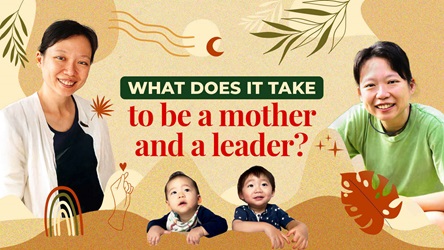“Creating Space For People To Rise And Succeed”, Kwek Mean Luck

It was pitch-dark, before the crack of dawn. The winds were howling and temperatures were near zero. Deputy Secretary (Development) of the Public Service Division (PSD) Kwek Mean Luck was on a barefaced slope with his 13-year-old son, attempting an ascent of Mount Kinabalu in Sabah. “Papa,” the boy said, putting his head down, “I cannot carry on.”
For Mr Kwek, this was a decisive moment. “As a father, I wanted him to succeed, but I also needed to keep him safe and sound,” he says, recounting the moment to Challenge at a cafe in the National Museum.
“I could have allowed him to give up, or carried him to the peak. But it would have been a very different experience for him. I wanted him to succeed on his own, without me dragging him up. So I said, ‘You can rest as often as you need. But when I say we need to move, you must move, or the cold winds will take you. We will do it, one step at a time.’ And that’s how he made it to the summit.”
“Later, I told my wife,” continues Mr Kwek, “as a parent, your heart always wonders if your child is all right and another part of you will say, you need to let them try.”

While a parent having faith in the potential of his child is not unusual, that Mr Kwek has the same belief in others – what he calls “creating space for people to rise and succeed” – is food for thought.
The Cambridge-educated Overseas Merit Scholarship holder and former District Judge is an active volunteer at Caritas, an umbrella organisation of Catholic charities. He explains his philosophy: “You walk with the poor rather than give to them… The moment you go in there thinking you are the one giving, the whole relationship is wrong – people never rise and you don’t create the space for them to rise and succeed.”
Mr Kwek started volunteering in his teens (“in part because of where and how I grew up – on the streets of Chinatown, with kids that many would consider juvenile delinquents”). He also spent time in Myanmar during the 1990s, teaching English to the Karen people living in the mountainous jungles.
“There was no electricity; the meals were the poorest grains of rice, and we bathed in the river. It drove home the realisation that you don’t need much materially to lead a fruitful life. I went there to teach, but in all honesty I took away a lot more than what I could give,” he recounts.
His experience as a volunteer has helped him at work – making him more “emotionally stable”, he says. In 2012, he was appointed to his current role at PSD, double-hatting as Dean of the Civil Service College (CSC). Barely a few months into his new job, he was also tasked to lead the Our Singapore Conversation Secretariat that helped to roll out the national dialogue.
More scope for collaboration
As Singapore evolves as a nation in the 21st century, with a better educated and more active public, there is increasing scope for a more collaborative model of governance.
“There is a possibility,” says Mr Kwek, “for Singapore to move to a stage where there is much greater partnership between government and citizens and participation by citizens.”
In fact, that is already starting to happen. “You can see some of it today,” he notes. “Increasingly there are opportunities for government to work with citizens to bring about outcomes that both parties want, like the Health Promotion Board’s healthy eating ambassadors and a NLB library in Chinatown run by volunteers.”

And in order for collaboration to be effective, mutual engagement is key – thus the importance of Our Singapore Conversation (OSC), which is “not just about a conversation between the government and citizens, but also amongst citizens,” he says.
“The fact that over 40,000 people took part shows that there are people who feel there is value to the conversation, in sharing their views and ideas, and in listening to other Singaporeans.”
The government believes likewise, he adds: “Because of the complexity of things, there is a greater need to listen and understand a wider range of views, and then still pull it together with wider strategic considerations when deciding what policies and programmes to push out.
“We are increasingly diverse as a society, but at some points we have to come together,” he concludes, “and I think OSC is one process of coming together. And it is in coming together, that we become a country.”
Jobs create dignity and pride
Working with the poor has made him keenly aware that many, if circumstances allow, would rather be fruitfully employed than receive help. Having a job creates a sense of “dignity and pride”, which elevates people above their circumstances. This belief led him to leave his job as a judicial officer in 2007 to join the Administrative Service and work at the Ministry of Trade and Industry, where he would have a hand in shaping policies for job creation. There, he subsequently rose to the position of Deputy Secretary.
“I enjoyed the law and still do; it was fulfilling and meaningful,” he says. “But as a judge there’s a limit to what you can do to help. By the time a juvenile comes to court, he would have spent years in a family where there are a number of issues, or built up a strong rapport with certain people in the street.

“You can put them on probation or place them in care, but I wanted to do something more upstream [and] preventive. Policy work provided an opportunity for that.”
At the same time, Mr Kwek has been applying the skills and knowledge picked up at work to his volunteering – from the judiciary, processes for impartial evaluations; from MTI, an understanding of how grant systems work; and from CSC, creating conducive environments for change and learning by paying attention to people’s mental and emotional states.
With so much going on in his life, the equanimous multi-hatter seems to have found an approach that works.
“My attitude is that in all that you do, give your very best,” he says with quiet conviction. “But don’t base your happiness on whether the outcome you were working for was achieved or not, because outcomes depend on a whole range of factors. Decide for yourself where you find peace and happiness.”
For him that lies in his family and his ability to contribute to society. So despite his full plate at work, the father of three makes sure he finds “sacred space” for his family. He wakes up early to be with his baby girl, reads to his three-year-old boy, makes sure he spends one-to-one time with his teenage boy, and keeps regular date nights with his wife.

“I’ve been very blessed,” he says. “I’m grateful for my wife and kids. I’m grateful for work that is meaningful and offers opportunities to give to something larger than myself.
“As one of my first bosses put it,” he concludes, “it is important that at the end of the day, no matter what has happened, you are able to say ‘well, I did my best’, go home and have a good dinner with your family, and enjoy the basic things in life.”

Where and when do you usually have your cuppa?
I like to have my kopi on the weekends from a coffee shop in an area of my neighbourhood that my family calls “Sleepy Hollow”.
- POSTED ON
Sep 19, 2013
- TEXT BY
Elaine Ee
- PHOTOS BY
Zakaria Zainal









